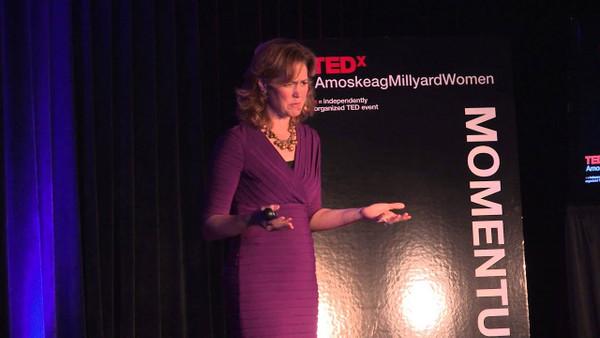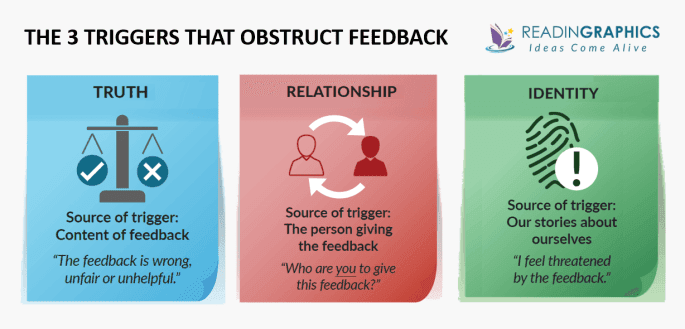How to use others' feedback to learn and grow | Sheila Heen | TEDxAmoskeagMillyardWomen
TEDx Talks
7 ideas
·1.5K reads
17
1
Learn more about videos with this collection
How to create customer-centric strategies
The importance of empathy in customer success
The impact of customer success on business growth
It's hard to receive feedback
People all over the world struggle with feedback.
In any feedback exchange between giver and receiver, it's the receiver who decides what they're going to let in and whether and how they will choose to change. However, if we could get better at this, it would make a huge difference.
Research shows that people who go out and solicit negative feedback, have higher work satisfaction, adapt quicker in new roles and get higher performance reviews.
33
309 reads
Receiving feedback is a skill
Getting a better handle on feedback changes you and how other people perceive you.
Think about a suggestion or advice you've received in your life that you've rejected. There could be hundreds of reasons why you didn't take it. Maybe it was wrong or bad advice, or perhaps you were not aware that you cared about their opinion. The problem is that you will always find something wrong with your feedback. 90% of it might be wrong, but 10% may be just what you need.
34
238 reads
Three kinds of triggered reactions
- Truth triggers. Is the feedback correct? However, we all have blind spots. It's tricky to figure out what the givers are trying to tell you.
- Relationship triggers. All feedback lives in the relationship between giver and receiver. We often have a bigger reaction to who's giving us advice than to what they're saying. We can conquer this trigger by separating the who from the what.
- Identity triggers have to do with your emotional reaction and what it says about who you are.
34
218 reads
Overreacting to feedback
Psychologists estimate that 50 percent of our reactions are based on genetic wiring, 40 percent on the story you tell yourself, and 10 percent on the actual circumstances.
- The story you tell yourself about the feedback you get has a huge impact on how you feel about it.
- High achievers. When we let ourselves down, the judgments and feedback we have for ourselves can be the hardest to deal with.
32
205 reads
The sensitive and undersensitive person
Some people are very sensitive to feedback, while others are the opposite. Both have their own challenges with feedback.
The sensitive person
One piece of feedback can suddenly become everything. It becomes super-sized. You may look at all your past mistakes, and it seems like you have never done anything right.
The undersensitive person
- You often don't realise people are trying to give you feedback. They may say, "Bill is doing this," and you think "good for Bill."
- You may acknowledge feedback, but then it doesn't stick.
- People may say you're aloof or overbearing, and you dismiss it outright.
31
186 reads
How to encourage feedback
- Identity. Ask your friends or colleagues, "what is the one thing I'm doing or failing to do that you think is getting in the way?
- What is the one thing I could change about how I run our weekly meeting that would be an improvement?
- What is the one thing that would make a difference to you in our friendship?
31
179 reads
Learn to manage pain to receive feedback
We have two core human needs.
- We want to learn and grow
- We also have a need to be accepted and respected and loved the way we are now. Feedback suggests that how we are now is not ok.
However, sometimes, the most painful things in our lives are some of the most important things we've learned in life. To get the most out of feedback, we have to learn to manage the pain to enrich our relationships and to get learning faster.
32
174 reads
IDEAS CURATED BY
CURATOR'S NOTE
This talk offers excellent insights into why nobody likes feedback, why feedback is good, and how to get the best out of feedback.
“
Other curated ideas on this topic:
Read & Learn
20x Faster
without
deepstash
with
deepstash
with
deepstash
Personalized microlearning
—
100+ Learning Journeys
—
Access to 200,000+ ideas
—
Access to the mobile app
—
Unlimited idea saving
—
—
Unlimited history
—
—
Unlimited listening to ideas
—
—
Downloading & offline access
—
—
Supercharge your mind with one idea per day
Enter your email and spend 1 minute every day to learn something new.
I agree to receive email updates



